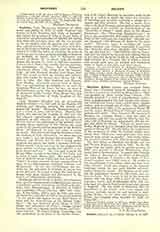

Beaulieu Abbey (abbatia quae vocitatur Bellus Locus) was a Cistercian house in Hampshire, one of the three monasteries founded by King John (c. 1204) and peopled by thirty monks from Citeaux. The founder granted it a rich, if miscellaneous, endowment, including land in the New Forest, corn, money, one hundred and twenty cows, twelve bulls, a golden chalice, and an annual tun of wine. The buildings were dedicated in 1246, in the presence of Henry III and his queen, Richard Earl of Cornwall, and many prelates and nobles. Pope Innocent III constituted Beaulieu an “exempt abbey”, with the right of sanctuary; and this was sought in 1471 by Ann Neville, wife of Warwick the King-maker, the day before the battle of Barnet. Twenty-six years later Perkin Warbeck fled to Beaulieu from the pursuing armies of Henry VII. Shortly before the suppression of the monastery in 1539, the Visitors’ report mentioned that “thirty-two sanctuary-men, who were here for debt, felony, or murder”, were living within the monastic precincts with their wives and families.
The first Abbot of Beaulieu was Hugh, and the last Thomas Stephens, elected in 1535. In the following year the abbey, with its annual revenue of £326, was granted to Thomas Wriothesley, afterwards Earl of Southampton. It passed later through the Dukes of Montagu to the Dukes of Buccleuch; and Lord Montagu of Beaulieu, the Duke of Buccleuch’s nephew, now (1907) owns it. He resides in the old gatehouse of the abbey, which has been care-fully restored. Little else remains of the domestic buildings, except the fine early English refectory, used as the parish church. The cloisters are in ruins, but the guest-house dormitory still exists, and has been restored. Not a stone is left of the beautiful church, 335 feet long, with a nave of nine bays, transepts, tower, and double-aisled choir with circular apse, of a purely Continental type most unusual in England. The late Duke of Buccleuch had the foundations of the church, with every column and buttress, carefully traced out and marked in sand. Netley Abbey, on the other side of Southampton Water, was founded from Beaulieu in 1239, by Henry III.
D. O. HUNTER-BLAIR.
Beaune, RENAUD DE, a French Bishop, b. in 1527 at Tours; d. 1606 in Paris. Before entering the ecclesiastical state he held secular positions such as Councillor of Parliament and Chancellor of Francis of Valois, Duke of Touraine. The royal court greatly favored him and appointed him to numerous ecclesiastical offices. In 1568, he became Bishop of Mende and in 1581, Archbishop of Bourges. King Henry IV of France named him his grand almoner in 1591 and appointed him to the Archbishopric of Sens in 1595; but the pope did not confirm the appointment until 1602. He was a member of the commission instituted by Henry IV in 1600 to reform the University of Paris. By his contemporaries, Renaud de Beaune was considered one of the greatest orators of the time. Posterity rated his work for the pacification of France higher than his oratorical talent. It was his influence that led to the successful issue of the conference of Suresnes, near Paris, in 1593. He promised the conversion of Henry IV and brought about peace between the latter and the “League“. He received the abjuration of the king, and, although the absolution of an excommunicated prince was reserved to the pope, absolved him, July, 1593, on condition, however, that the approval of the Roman authorities should be obtained. In spite of this condition the absolution was invalid, and the action of the archbishop caused, at least partly, the delay in obtaining the papal confirmation of his nomination to the See of Sens. The principal works of de Beaune are: (I) Some discourses, among them funeral orations on Mary, Queen of Scots (1587), and on Queen Catharine de Medici (1589); (2) translation of the Psalms of David into French (Paris, 1575, 1637); (3) “La reformation de l’universite de Paris (1605, 1667).
N. A. WEBER

